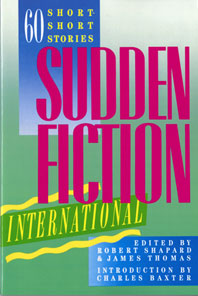 I’ve decided to write brief notes on the short stories that I read this year. Lately, I feel a need to write my reactions down somewhere. There should be several of these round-ups each month.
I’ve decided to write brief notes on the short stories that I read this year. Lately, I feel a need to write my reactions down somewhere. There should be several of these round-ups each month.
All the stories below are from Sudden Fiction International: 60 Short Short Stories edited by Robert Shapiro and James Thomas.
One
“The Falling Girl” by Dino Buzzati (Italy)
Translated by Lawrence Venutti
I’ve reviewed this dazzling story here.
Two
“Death of the Right Fielder” by Stuart Dybek (U.S.)
I’m a baseball fan and was delighted to read this story. Though knowledge of baseball is not required, it helps to know that traditionally nothing much is expected of the right fielder position. Most balls are hit to the center or left field. The right fielder, in this story, dies out in the field. Theories abound as to the cause of death. Magical realism with dark humor. In just four short pages, Dybek captures the life of 20th Century folks in middle America. I might write a full review on it. Excellent story.
Three
“Blackberries” by Leslie Norris (Wales)
The story starts sweetly and innocently when a mother takes her young son for his first haircut, then shopping for a new cap. As it progresses, I started to sense that something bad was coming. And it does but not like I had imagined. Instead, the boy learns for the first time that his parents “were different people” and “that he must learn sometimes to be alone”. Touching and profound.
Four
“Don’t Blame Anyone” by Julio Cortázar (Argentina)
Translated by Alberto Manguel
This is the first work by Cortázar that I’ve read, though I’ve been meaning to read him for years. I had to read this short several times and still it leaves me scratching my head. A man tries to put on his sweater. Who knew that wearing a piece of clothing could be a nightmare? And yet I could not discern an injury or a disability. Surreal and experimental. I probably need to read it again and again and…
Five
“On Hope” by Spencer Holst (U.S.)
A gypsy animal trainer has trained a monkey to steal jewelry. British royalty visit the Rock of Gibraltar bringing with them a necklace with the curse Diamond of Hope. The monkey steals the necklace and the trainer returns it with a note to the “princess”. This happens three times. After the third theft, the trainer decides to throw the cursed gem down a trench in the sea. The actual story ends with the man swimming towards a shark. But the author notes, in three points, that there is reason to remain hopeful that the trainer prevails. This is all part of the story. Funny.
Six
“Happy Endings” by Margaret Atwood (Canada)
This reads as though Atwood was giving a lecture on plot and endings. It begins with:
John and Mary meet
What happens next?
If you want a happy ending, try A
A is a short plot on John and Mary’s good life together. She then presents 5 different scenarios but cautions that they all end with A. “Plots”, she says “are just one thing after another, a what and a what and a what”. Now try How and Why”. Hilarious story.
Seven
“The Grasshopper and the Bell Cricket” by Yasunari Kawabata (Japan)
Translated by Lane Dunlop
The narrator observes a group of children playing and looking for insects; their paths are lighted by paper lanterns. One boy gives a grasshopper to a girl but she discovers, when she opens her palm, that it is a bell cricket. An inspirational story about hanging onto the beautiful moments of one’s life when all else turns to gray.
[…] International: 60 Short Short Stories edited by Robert Shapiro and James Thomas. I enjoyed the first seven stories and look forward to working my way through the […]
LikeLike
These all sound so very different but so very interesting as well. So glad you’re sharing your thoughts with us here! Please do continue 🙂
LikeLike
I plan to continue sharing the stories that I read. In part, because I don’t want to forget them. Also, I review almost every novel that I read so why not shorts? Lots of come I guess.
LikeLike
I still don’t understand why some people don’t love short stories. When handled properly, short story is a lot of fun and it is also difficult because a lot has to be said and done with a limited amount of space to manoeuver hence sticking with the important things.
“I probably need to read it again and again and…” perhaps this is what I should do with ‘How Shall We Kill the Bishop’.
All the stories sound interesting and I guess Atwood’s would be a real lesson for budding, and aspiring, writers like us.
LikeLike
I’m loving the stories that I’m reading lately. I think most people who say they don’t like short stories probably don’t know how to read the stories. And also won;t invest the patience and time to get to know a stories. Yes, you most definitely have to read the Mabura story again.
LikeLike